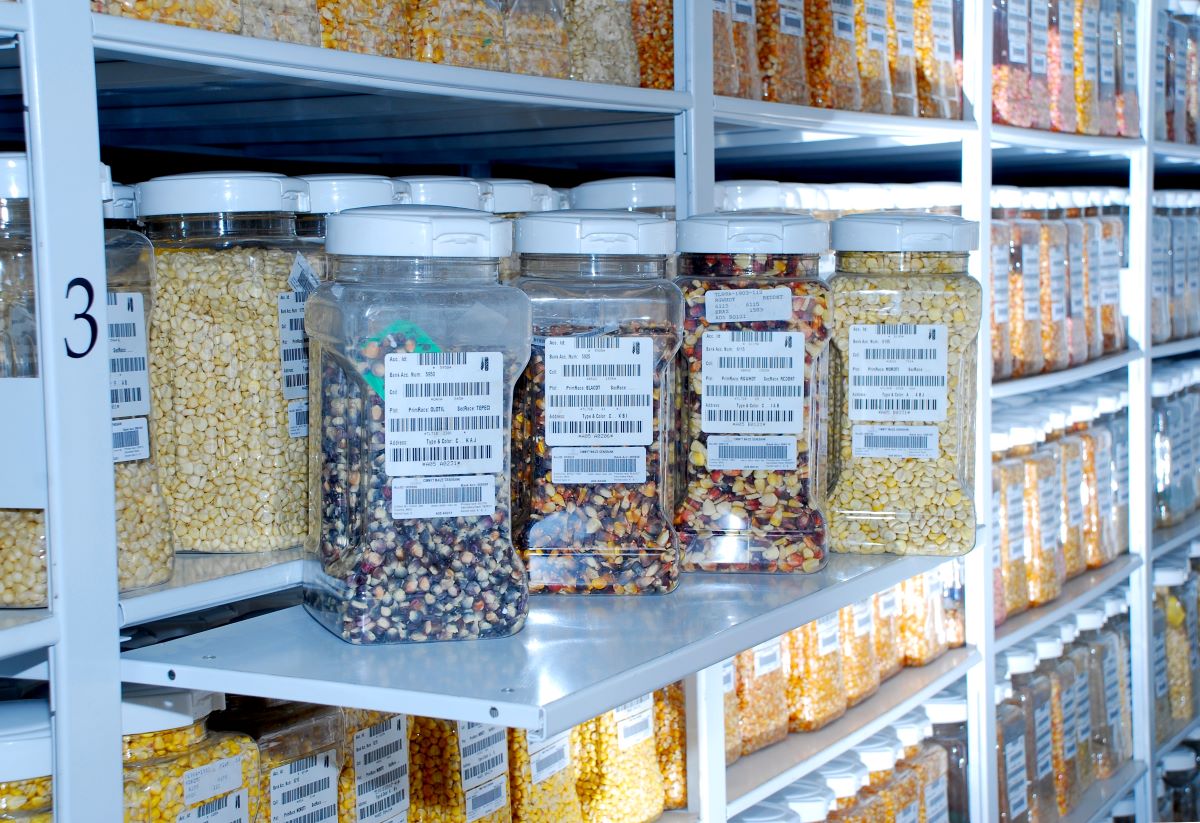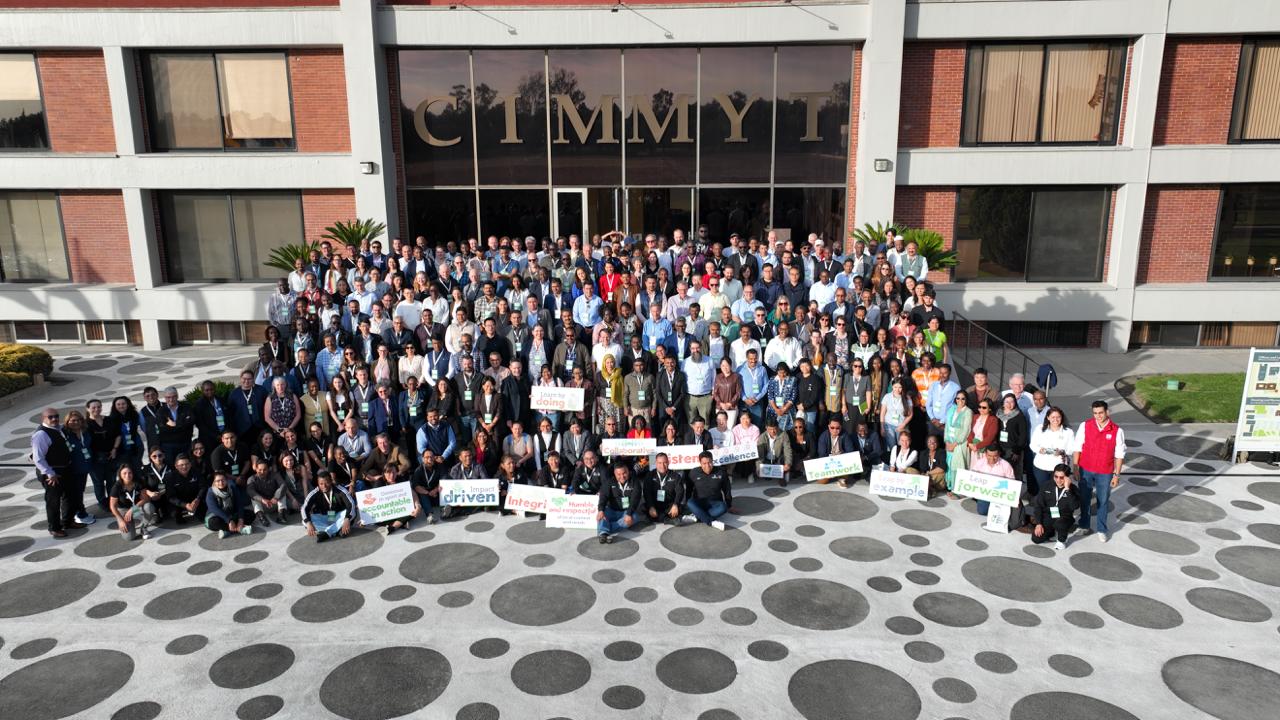For the sixth installment of the ongoing seminar series on women’s leadership—Catalysts of Change: Women Leaders in Science—CIMMYT had the opportunity to interact with Ismahane Elouafi, Executive Managing Director of CGIAR. This session was held when Ismahane was Chief Scientist at the Food and Agriculture Organization (FAO).
At the outset, Bram Govaerts, Director General of CIMMYT, introduced Ismahane as a strong advocate for diversifying into neglected and underutilized crops and rethinking the food system as a whole. “She is an early advocate for resilience and inclusion from a human and biological perspective, is internationally known for promoting the use of non-fresh water in agriculture, and empowering women in science,” he said.
From fighter pilot to agricultural scientist
Ismahane outlined her career trajectory—her initial fascination with the sciences, particularly in biology and genetics, during school; how her military training in Morocco to become the nation’s first female fighter pilot had to be aborted, prompting her to pursue a new career; her subsequent enrollment in an agricultural college, as other specialized institutions did not have available seats; and how, despite the hiccups, she went on to obtain a Master’s degree in Genetics and Plant Breeding, followed by a Ph.D. in Genetics.
“I do not succumb easily to discouragement, certainly not to prejudice or naysayers,” she stated. “Curiosity and perseverance have consistently guided me over the past 25 years of my career.”
Diverse background leads to diverse thinking
Ismahane describes herself as a mother of two wonderful children, a Moroccan who immigrated to Canada, an Arab Muslim woman, and a passionate advocate for genetics.
Coming from a family of six daughters, she noted that discrimination or favoritism played no role in her upbringing. “My parents encouraged our curiosity and instilled in us a love for learning and sharing knowledge,” she said. Ismahane selected her fellowship opportunities with ICARDA and CIMMYT due to their international exposure, which enabled her to move from laboratory to laboratory and university to university, allowing her to explore new technologies and engage in global projects.
In each setting, she learned more than just science. “I learned how to deal with people, appreciate diverse cultures, languages, and food.” She stressed the importance of learning new languages and how learning Spanish opened doors for her in Latin America. “Not understanding each other makes us defensive, leading to problems in the world,” she told her audience.
More scientists needed in management
At a point in her life when she wanted to settle down and have a family, Ismahane migrated to Canada—what she calls “a new chapter.” In Canada, she got a chance to work with the federal government in Ottawa and gained experience in science management. “It made me look at science differently—how budgets are allocated, how performance is measured, how to work with different stakeholders. This was a big learning curve for me,” she said, adding that if we want science to be heard and used in policy and budget decisions, we need more scientists in management. “You can’t let lawyers and finance people run the shop.”
After moving across different management roles, she realized that her calling was international development. “It took me going to Canada, being part of Canada’s systems and bureaucracy, and learning science management to realize that my heart lies in international development using science, tech, and innovation.”
She also shared insights about her strategic work at FAO, which aimed to achieve the “four betters”—better production, better nutrition, better environments, and better life, leaving no one behind. “For me, leaving no one behind and having a better life for everybody based on agriculture is very important,” she shared.
In a follow-up interview with Andrea Gardeazabal, Monitoring, Evaluation, and Learning Manager – ICT for Agriculture at CIMMYT, Ismahane shared some challenges of being a woman leader or scientist in a male-dominated field.
“They are the same challenges as those of being a good scientist: finding the right subject, securing the right resources, and having the right partners. But for women, particularly young women, you also have to prove yourself in a new place,” she said.
Her advice to younger women in science was: “You have to like what you’re doing or move on. By moving, you grow. There are so many opportunities, and so much to do. Hence, be in a place that you like. Believing in what you do and enjoying it makes the difference.”
Changes needed to make research organizations more inclusive
Ismahane shared that organizational policies aimed at supporting women must address the fundamental biological needs of women, allowing them to fulfill their roles as mothers and maintain their families. For that, a robust support system within the workplace is essential.
“In all sectors, but more in science and agriculture, we need positive discrimination,” she said. She explained that this does not imply selecting women who lack qualifications; rather, it means providing opportunities for qualified women to enter and excel in these fields. “It will be necessary to maintain such measures for the next 50 to 70 years to promote a more balanced workforce, because right now the numbers are not encouraging at all, particularly when you go into senior management,” she said. “We need to put in place policies that encourage women to continue in their careers,” she added.
Key insights about building resilient and sustainable agri-food systems
Ismahane pointed out how historically the agricultural sector has focused on a limited number of species because of economic restraints, which rendered the agriculture sector susceptible to climate change and a contributor to the problem. “Transformation of the agri-food system is a must—it’s not optional. We must create a system that is more resilient, sustainable, inclusive, and efficient,” she emphasized.
Ismahane also pointed out how the logistics of moving agricultural commodities globally often do not make sense and can worsen greenhouse gas emissions. “Currently, data related to commodity transport and emissions are largely controlled by multinational companies, who rarely share this information,” she said. Leveraging traceability to assess the carbon footprint of commodities can promote responsible trading and support local and regional production, she explained.
The floor then opened for audience Q/A.
Click here to watch the seminar video or visit our website.

 Climate adaptation and mitigation
Climate adaptation and mitigation 
